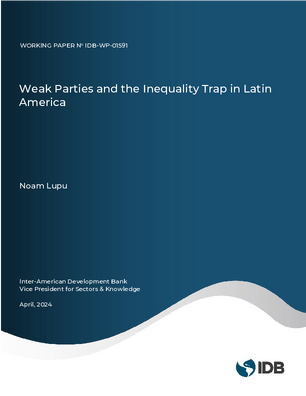Weak Parties and the Inequality Trap in Latin America
Date
Apr 2024
Latin America is widely acknowledged as one of the most unequal regions of the world (Sánchez-Ancochea 2021). But it is also one of the most democratic, certainly as compared to other developing regions. These two facts seem difficult to reconcile. Both folk theories of democratic representation to borrow a phrase from (Achen and Bartels 2016) and canonical models in political economy would have us believe that democracies ought to reduce inequality through redistribution (e.g., Acemoglu and Robinson 2006; Meltzer and Richard 1981; Romer 1975). As inequality increases, the proportion of the population that would benefit materially from redistribution also increases, making it more likely that a pro-redistribution political coalition would win elections and deliver social policy. And yet, despite several decades of uninterrupted electoral democracy in most of the region, Latin American governments have consistently and with but few exceptions failed to reduce inequality substantially.
This paper begins by discussing why contemporary Latin American party systems are weak, focusing on both structural/institutional factors that pull party systems toward less institutionalization and recent changes to the regions political economy that undermined the more institutionalized systems. Then links the regions low levels of party-system institutionalization with lower levels of redistribution, both theoretically and empirically through cross-national comparisons. Finally, the mass and elite surveys show that legislatures in the region fail to reflect the pro-redistribution preferences of voters, further demonstrating how weak parties undermine the representation necessary for successful redistribution.
This paper begins by discussing why contemporary Latin American party systems are weak, focusing on both structural/institutional factors that pull party systems toward less institutionalization and recent changes to the regions political economy that undermined the more institutionalized systems. Then links the regions low levels of party-system institutionalization with lower levels of redistribution, both theoretically and empirically through cross-national comparisons. Finally, the mass and elite surveys show that legislatures in the region fail to reflect the pro-redistribution preferences of voters, further demonstrating how weak parties undermine the representation necessary for successful redistribution.
Generative AI enabled





